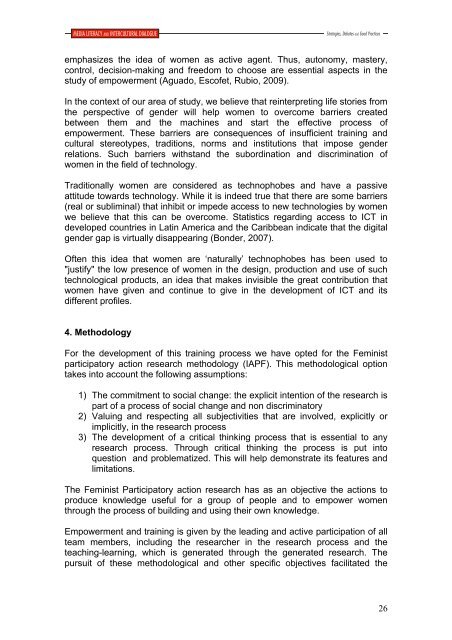Libro
Libro
Libro
Create successful ePaper yourself
Turn your PDF publications into a flip-book with our unique Google optimized e-Paper software.
MEDIA LITERACY AND INTERCULTURAL DIALOGUE<br />
Strategies, Debates and Good Practices<br />
<br />
emphasizes the idea of women as active agent. Thus, autonomy, mastery,<br />
control, decision-making and freedom to choose are essential aspects in the<br />
study of empowerment (Aguado, Escofet, Rubio, 2009).<br />
In the context of our area of study, we believe that reinterpreting life stories from<br />
the perspective of gender will help women to overcome barriers created<br />
between them and the machines and start the effective process of<br />
empowerment. These barriers are consequences of insufficient training and<br />
cultural stereotypes, traditions, norms and institutions that impose gender<br />
relations. Such barriers withstand the subordination and discrimination of<br />
women in the field of technology.<br />
Traditionally women are considered as technophobes and have a passive<br />
attitude towards technology. While it is indeed true that there are some barriers<br />
(real or subliminal) that inhibit or impede access to new technologies by women<br />
we believe that this can be overcome. Statistics regarding access to ICT in<br />
developed countries in Latin America and the Caribbean indicate that the digital<br />
gender gap is virtually disappearing (Bonder, 2007).<br />
Often this idea that women are ‘naturally’ technophobes has been used to<br />
"justify" the low presence of women in the design, production and use of such<br />
technological products, an idea that makes invisible the great contribution that<br />
women have given and continue to give in the development of ICT and its<br />
different profiles.<br />
4. Methodology<br />
For the development of this training process we have opted for the Feminist<br />
participatory action research methodology (IAPF). This methodological option<br />
takes into account the following assumptions:<br />
1) The commitment to social change: the explicit intention of the research is<br />
part of a process of social change and non discriminatory<br />
2) Valuing and respecting all subjectivities that are involved, explicitly or<br />
implicitly, in the research process<br />
3) The development of a critical thinking process that is essential to any<br />
research process. Through critical thinking the process is put into<br />
question and problematized. This will help demonstrate its features and<br />
limitations.<br />
The Feminist Participatory action research has as an objective the actions to<br />
produce knowledge useful for a group of people and to empower women<br />
through the process of building and using their own knowledge.<br />
Empowerment and training is given by the leading and active participation of all<br />
team members, including the researcher in the research process and the<br />
teaching-learning, which is generated through the generated research. The<br />
pursuit of these methodological and other specific objectives facilitated the<br />
26



